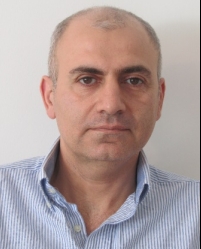Title: Adaptive and Intelligent Sensing: The Rise of Cognitive Radars
Speaker: Prof. Joseph Tabrikian(IEEE Fellow)
Affiliation: Ben-Gurion University of the Negev
Abstract: The field of radar technology is undergoing a revolutionary transformation with the introduction of cognitive radars, which enhance situational awareness capabilities and adaptability in complex environments. This talk will explore the foundational concepts, technological advancements, and future prospects of cognitive radars, positioning them at the forefront of intelligent sensing systems.
Cognitive radars are characterized by their ability to sense, learn, and adapt in real-time, mimicking the cognitive functions of the human brain. Unlike traditional radar systems that operate on predefined algorithms and static parameters, cognitive radars continuously analyze their operational environment, learning from the received data to dynamically optimize the performance. This talk will detail the key components that constitute a cognitive radar system, including the perception-action cycle, adaptive waveform design or antenna selection, and feedback mechanisms.
Specifically, the talk will explore advanced concepts and innovations in cognitive multiple-input multiple-output (MIMO) radars and cognitive antenna selection. In cognitive MIMO radars, there is a tradeoff between higher angular accuracy and resolution obtained by orthogonal signal transmission, and higher beam gain and signal-to-noise ratio (SNR) obtained by coherent signal transmission. Cognitive MIMO radar adaptively designs the transmit autocorrelation matrix based on past observations. Similarly, in cognitive antenna selection, the radar system intelligently selects the optimal subset of antennas to maximize detection and localization performance.
The discussion will also cover various optimization criteria commonly used for cognitive radars, such as maximizing SNR, accuracy, and resolution. Through case studies, we will illustrate practical implementations of these concepts in defense and autonomous vehicles applications to demonstrate how cognitive MIMO radars and smart antenna selection can significantly improve radar performance in terms of detection capability, spatial accuracy and resolution, and radar coexistence.
In conclusion, cognitive radars represent a significant leap towards intelligent and autonomous sensing systems. By harnessing the power of cognitive processing and machine learning, these systems promise to revolutionize the radar technology landscape, offering unprecedented levels of adaptability and efficiency in dynamic and uncertain environments.
Biography:

Joseph Tabrikian received the B.Sc., M.Sc., and Ph.D. degrees in Electrical Engineering from the Tel-Aviv University, Tel-Aviv, Israel, in 1986, 1992, and 1997, respectively. During 1996–1998 he was with the Department of Electrical and Computer Engineering (ECE), Duke University, Durham, NC as an Assistant Research Professor. In 1998, he joined the Department of ECE, Ben-Gurion University of the Negev, Beer-Sheva, Israel, and served as the department head during 2017-2019. In May 2019 he established the school of ECE and served as its head till August 2021. He served as AE and SAE of the IEEE Signal Processing Letters during 2012-2015 and 2015-2018, respectively. He served as an Associate Editor (AE) for the IEEE Transactions on Signal Processing during 2001–2004 and 2011-2015, and is currently a Senior Area Editor (SAE) for these transactions. He is currently also a Subject Editor for the Elsevier Signal Processing journal. He was a member of the IEEE Sensor Array and Multichannel (SAM) technical committee during 2010-2015 and was the technical program co-chair of the IEEE SAM 2010 workshop. During 2015-2021 he served as a member of the Signal Processing for Multisensor Systems (SPMuS) of EURASIP and during 2017-2022 he was a member IEEE SPTM technical committee. His research interests include estimation and detection theory, learning algorithms, and radar signal processing. He is a Fellow of IEEE and AAIA.